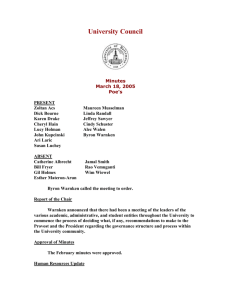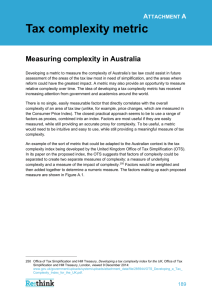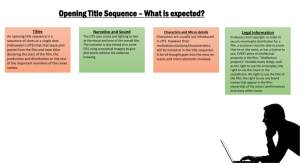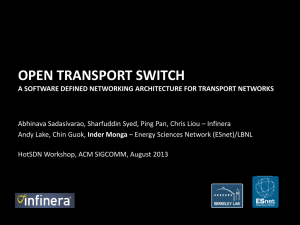Joint TLRC / OTS Conference on Tax Simplification
advertisement
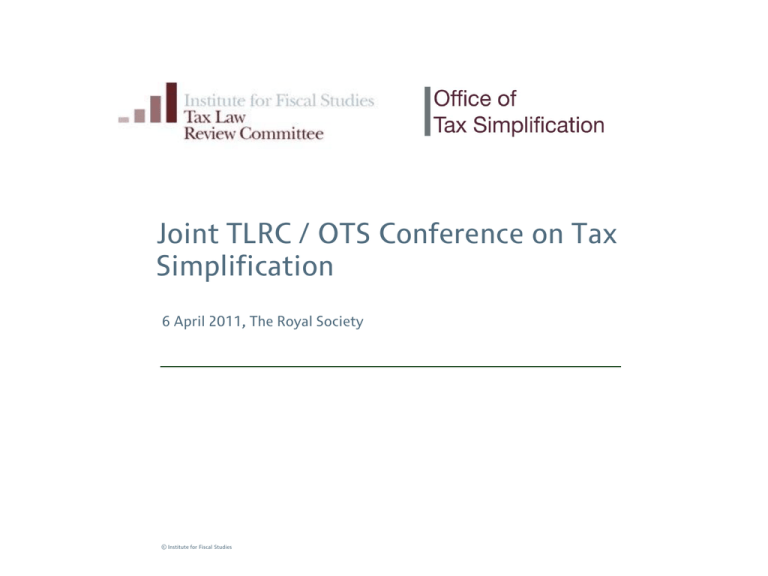
Joint TLRC / OTS Conference on Tax Simplification 6 April 2011, The Royal Society © Institute for Fiscal Studies The first six (simplified) months..... The OTS: aims and objectives John Whiting Tax Director, Office of Tax Simplification • Part of Government’s commitment to a ‘simpler tax system’ - Follows Howe report, etc - Created for lifetime of current Parliament - Independent (but located in Treasury) • Organisation - Chairman Michael Jack* Director John Whiting* 3 HMT/HMRC people 4 private sector secondees* Consultative committees OTS Board * part-time, unpaid Principles • All HMRC taxes - not tax credits and benefits - existing law (new law via Tax Policy Making principles) • Revenue neutral - balanced package • Report with recommendations - first main reports to inform Budget 2011 - can’t change things • Wide consultation - open project - ‘roadshows’ (40+) OTS aims: Simplification (What is simplification?) - Technical vs Administrative complexity - both are equal? Three initial projects (1) Tax Reliefs (2) Small business taxation (including IR35) (3) Proof of concept (unofficial) Initial Projects: (3) Proof of concept (unofficial!) • Set up the OTS • Work up a methodology • Produce useful material • Engagement with what we are doing ....begin to make a difference ….how are we doing? Tax simplification..... ...Institutional framework and political impediments Michael Jack Chairman, Office of Tax Simplification Tax – the institutional framework • The most important government power? - Commons v Lords • Who controls the tax system? - Parliament Chancellor Treasury HMRC (others....?) • How does the OTS fit in? Political impediments ...or encouragement • Who controls the tax system? - Chancellor • Political expediency - political pressures - 100 v 382 • Simplification works! - political commitment to OTS findings OTS continuing involvement meaningful projects The OTS: future role and strategy John Whiting Tax Director, Office of Tax Simplification The OTS: future role and strategy (1) Does the OTS have a future? - wind up and save money - stop distracting HMT/HMRC - can’t really achieve anything meaningful Conclusion – the OTS should continue! - though does it become permanent? (2) So what should the OTS do? - Big projects/structural? - Single tax? - Distinct area? - Detailed projects? (2) So what should the OTS do? - Big projects/structural? (IT& NICs/Benefits & expenses) - Single tax? (IHT/Aggregates levy) - Distinct area? (Share schemes/Pensioners) - Detailed projects? (Harmonise definitions) - Small change vs major reform - Some of everything? (3) How should the OTS operate? • Independent • Small team • Mix of HMT/HMRC & private sector secondees • HMRC/HMT/private sector cooperation • Consultative committees ....all good features ….so continue (3) How should the OTS operate? • Independent (do we show it?) • Small team (too small?) • Mix of HMT/HMRC & private sector secondees (unpaid) • HMRC/HMT/private sector cooperation (maintain?) • Consultative committees (can we assume commitment?) ....all (less) good features (or challenges) ….so manage them The OTS: future role and strategy John Whiting Tax Director, Office of Tax Simplification ots@ots.gsi.gov.uk
